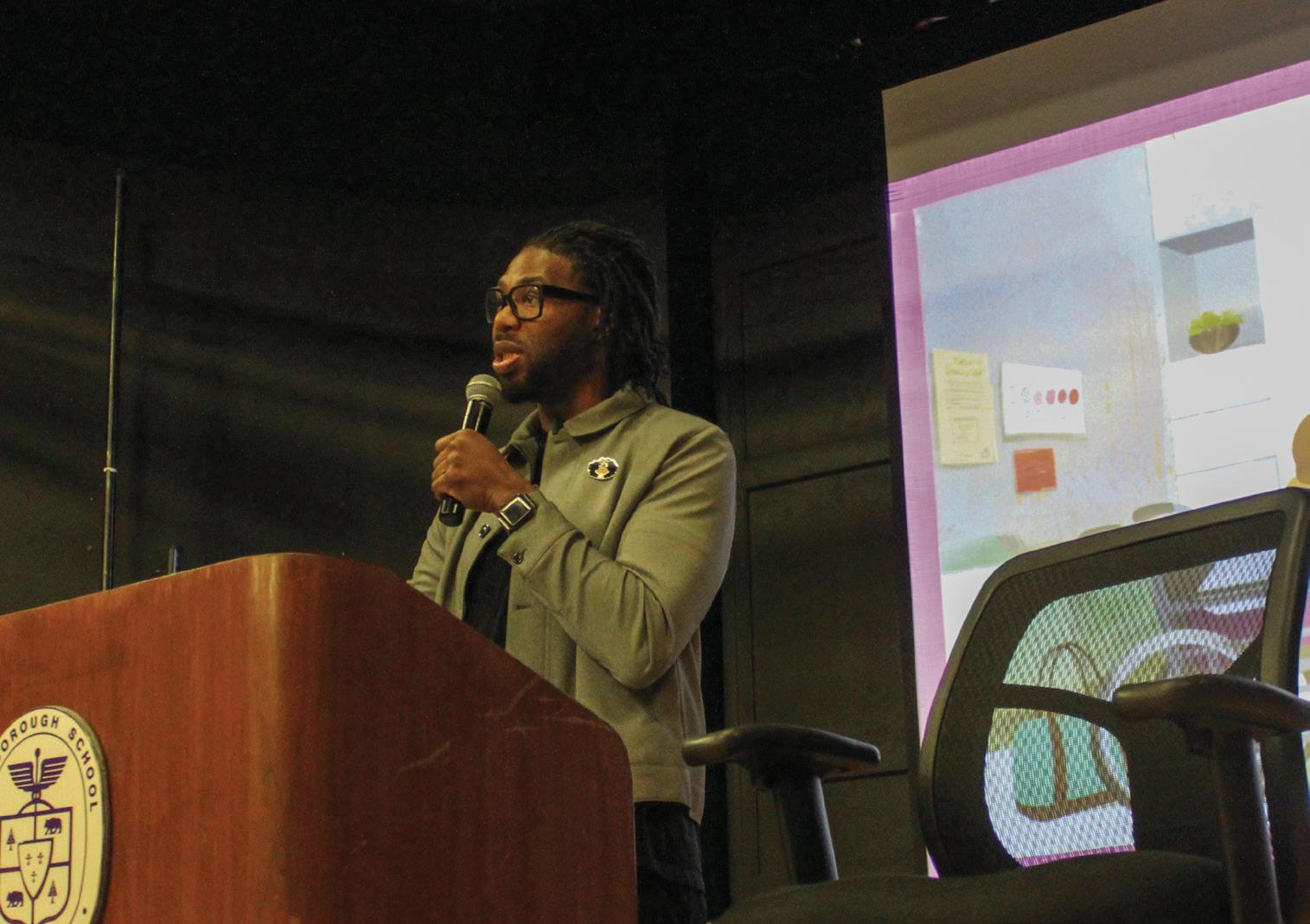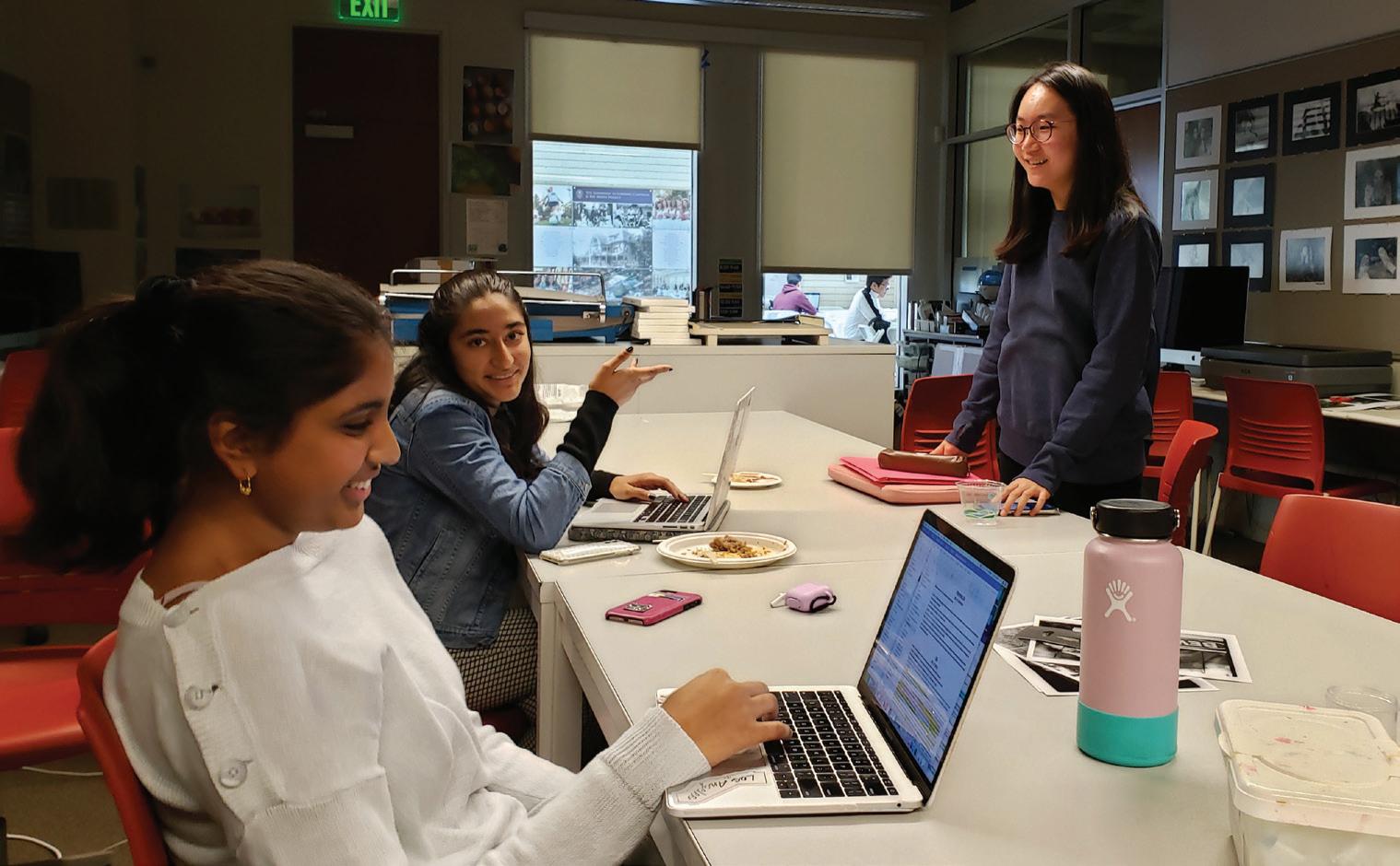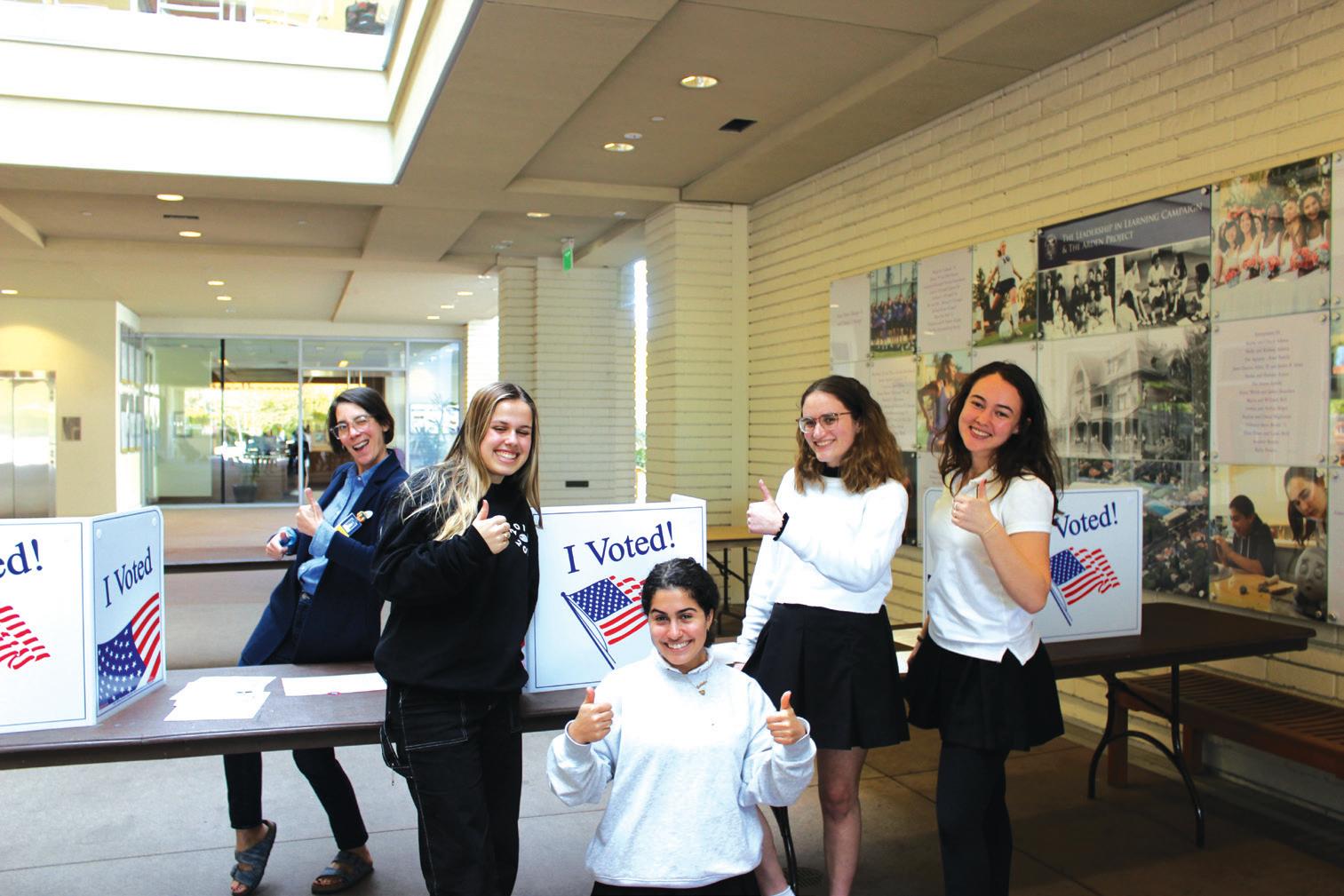
14 minute read
News and Policy
marlborough student radio www.kmbrradio.com

Advertisement





matthew cherry presents short “Hair love”
Director, writer, producer and former NFL player Matthew Cherry spoke to the Marlborough student body at an All School Meeting about his Oscar-winning animated short “Hair Love,” which was also screened for the students. Hair Love, in just under seven minutes, tells the story of a hectic morning as a young African American girl and her father attempt to style the girl’s hair. The viewer later discovers that she is preparing to visit her sick mother in the hospital. While the pair struggle through many styles, braiding techniques and products, the father is finally able to give the girl a hairstyle that she is proud of to show off to her mom.
—micah patterson ‘21
By fiona tarses
Patterson ‘21, Cherry’s visit was a welcome change. “There are so many more cool things to talk about during ASMs, and I am so glad we were able to talk about animation and representation in this one,” Patterson said. Patterson, along with other African American Cultural Exchange leaders Sonora Robles ‘21 and Hayden Hill ‘20 introduced Cherry and asked him questions. “I was so happy when I found out that he was coming. I feel like it’s much needed to have an African American man who’s doing so well in the animation world to come and speak and show us what he’s been doing,” Patterson said. Patterson also appreciated that the ASM shined light on the struggles some African Americans faces with their natural hair, considering it is an issue that goes largely undiscussed at Marlborough. “It’s little things like hair representation that often affect young women of color, specifically African American women, so I thought it was really amazing that he was able to bring that to Marlborough and make people aware of what’s going on,” Patterson said. “He talked about The Crown Act a little, which was really great. For people who don’t know what it is, it’s a set of laws that will help people in the workplace to not be discriminated against for their natural hair.” Robles was also very pleased with Cherry’s discussion of hair, and with his speech in general. “In AACE we talk a lot about hair and issues with hair and his video, and even if you have straight hair you can relate to it, your dad doing your hair cause it’s not traditionally what the dad does,” Robles said. “I felt like it was a good film that everyone could relate to.”
According to Cherry, “Hair Love” was the product of many sources of inspiration. He was initially moved by a viral video of a father trying his best to do his young daughter’s hair, and realized that a semi-recreation of said video would also be a powerful and accessible way to represent the unique relationship between African American women and their hair. He also wanted to represent the African American father figure positively to combat more negative depictions of African American men in film. Cherry’s discussion of his film differed from many of the more STEM/entrepreneurship-centered ASMs. For Micah

Marlborough hosts debate tournament Anya Karumanchi ‘22, Ela Desai ‘23 and Jeanie Kim ‘23 prepare for a debate tournament at Marlborough.

By catherine esrey
For the first time in its history, Marlborough’s speech and debate program held the Spring Championship Debate Tournament, from March 6 to March 8. While Marlborough has hosted tournaments before, they have never hosted a tournament that lasts more than one day. Marlborough hosted about 25 schools with 140 people in total from across the nation. While University of Southern California (USC) usually hosts this tournament, Marlborough stepped up as the host due to an administrative mix-up with USC’s policy of minors on campus. USC was unable to resolve the problem in time, but they are expected to resume hosting the tournament next year. The Spring Championship had two debate categories: Lincoln-Douglas debate, a one-on-one competition, and Policy debate, a team of two against another team of two. Marlborough uses the Lincoln-Doughlas debate style. Each category has its own topic for debaters to prepare before the actual debate. Lincoln-Douglas debate used the topic of whether the United States should eliminate their nuclear arsenals. According to Speech and Debate Coach Adam Torson, Marlborough is lucky to be able to host this tournament as it is a key tournament to qualify for the Tournament of Champions. The Tournament of Champions is a national high school debate tournament that occurs every year during the last week of April. In order to qualify for the Tournament of Champions, the participant must have two bids from previous debate tournaments. A bid is an acknowledgment of outstanding performance at national tournaments. “The tournament that we are hosting is called a semifinals bid, so it’s big enough and competitive enough that the debaters who reach the semi-finals, the last four, will
get one bid to the tournament of champions,” Torson said. Before the tournament, Julia Steinberg ‘20 was the only member of Marlborough’s debate team who had a bid. A second bid for Steinberg would have allowed her to advance to the Tournament of Champions. Steinberg is co-captain of the team and has been doing debate since her freshman year. This was her last tournament before the Tournament of Champions. “The tournament I received my bid at, Ulta, was a semi-finals bid. So if you reached semi-finals at the tournament, you got a bid,” Steinberg said. Steinberg reached double octo-finals, which is an elimination round, comprised of 32 debaters. Because Steinberg did not receive a second bid, she and Torson are working on an application for an at-large bid, explaining why she is qualified to move on to the Tournament of Champions. Since this is Steinberg’s last year on the Marlborough debate team she shared her favorite part. “Being able to share different arguments and explain different arguments with younger members of the team is something I found to be really engaging and exciting for me,” Steinberg said.

workshop to educate about charities

By macy lernerBy macy lerner
“How You Can Help” lunch-time workshops, hosted by the Social Justice and Community Partnerships department, are educating students about the charities supported by January’s Spirit Week donation drives. Featured nonprofi ts include Alexandria House, St. Anne’s Home, Para Los Niños, the Karsh Center and Soles4Souls. This is the second year during which these workshops have taken place.
These workshops were created last year after Student Council Community Partnership Representatives wanted stuILLUSTRATION BY EL BERGER “if they feel like they have a grasp on the issues that we are talking about, then they are able to participate more confidently.” —ava eisendrath ‘21
dents to be aware of the charities they were supporting during Spirit Week, according to Community Partnerships Program Head Javier Espinoza. “They exist because of students,” Espinoza said. “The Community Partnership students last year were very specifi cally saying we should keep on having this be something that doesn’t end after Spirit Week.” These workshops teach students about the problems that the charities are working to solve. The charity Soles4Souls, for example, takes shoe and clothing donations and ships them to small business owners in Honduras to help spur its economy. The workshop with the date and speaker yet to be announced, will address why there is an infl ux of asylum seekers from Honduras and how Soles4Souls works to address such problems. Ava Eisendrath ‘21 attended the “How You Can Help” workshops last year. “People want to get involved but they don’t know how,” Eisendrath said. “This is an introduction on issues that are complex and important.” Eisendrath said she hopes students will become more involved in volunteering in their community once they gain a better grasp on issues covered in these workshops. “The community partnership students last year were very specifically saying we should keep on having this be something that doesn’t end after spirit week.”
—javier espinoza
“A lot of people tell me they are fearful because they don’t know anything,” Eisendrath said. “If they feel like they have a grasp on the issues that we are talking about, then they are able to participate more confi dently.”
School hosts mock
By Sophie Dorf-Kamienny
In anticipation of primary elections across the nation, students and faculty arranged for a mock election within the school community.
Striding confidently through the East Atrium with a ballot in hand, Tess Inderbitzin ‘21 cast her vote in the primary election, despite being only 16 years old. Sporting her “I Voted” sticker, Inderbitzin was among 457 Marlborough students, faculty and staff to participate in the mock primary election on Tuesday, Feb. 25. to student volunteers from the Right to Assemble club and Community Partnerships Council, re-created the programming specially for the March 3, 2020 primary election in California. Although Vitanza omitted some district-specific measures because they were irrelevant for many “voters”

Dr. Elizabeth Vitanza, Lily Langos ‘20, Gabi Becher ‘20, Arin Littman ‘20 and Lily Bragin ‘20 smile by the voting booths on mock election day.
This is the second time Marlborough has hosted a mock election. The earlier election took place in October 2018 and was part of California’s “Student Mock Election” drive promoted by California Secretary of State Alex Padilla. This year, World Languages Department Head Dr. Elizabeth Vitanza and Community Partnerships Program Head Javier Espinoza, in addition
living outside Marlborough’s district, community members had the opportunity to vote in both Republican and Democratic presidential primaries and on state and county ballot propositions. Results were released to the entire school community on the same day as the election, revealing Mayor Pete Buttigieg as the winner of the Democratic Primary by only one vote, with Senator Elizabeth Warren close behind. The candidates received 28.5% and 28.3% of the vote, respectively, followed by Senator Bernie Sanders with 20.8%. The six other Democratic candidates remaining at the time each received less than 6% of the vote.
—lily bragin
While single-digits indicated a clear loss for Democratic candidates, President Donald Trump won the Republican Primary despite accruing only 2.4% of the total votes. In addition, both ballot measures received notable support, with 89.73% voting yes on California Proposition 13 to increase funding for public education and 82.6% voting yes on Measure R to facilitate reduced incarceration in Los Angeles County. Inderbitzin said her participation was partly motivated by an interest in various political opinions at Marlborough. “I think it’s fascinating. It tests my own opinions, which I don’t know if I’ve completely sorted out all the way, and I discover them in a fun little moment in the booths,” Inderbitzin said. “I’m really interested in
primary election
what the school will say as a whole, and I know that if I contribute, it will add to the pool and it’s more interesting.” Students and faculty also signed up as volunteers to facilitate the voting process. Volunteer and Right to Assemble Co-President Lily Bragin ‘20 said she was particularly enthusiastic about the mock election because she has noticed an underrepresentation of youth in politics. “I remember being very excited to take part in mock elections when I was younger because when you see the results from the regular general elections and primary elections, you don’t really feel connected because you’re not being represented in them,” Bragin said. “To have a secondary set of results that you feel like you
—dr.elizabeth vitanza
and your peers had a say in is very interesting and is also an incentive to vote in the future.” Vitanza said that the voices of young voters are not heard to the extent that they should be, regardless of party
alignment. This pattern, she believes, is largely due to low voter turnout among younger demographics. “18- to 24-year-olds have some of the worst voter turnout for many reasons, but in California, there’s really no excuse for it,” Vitanza said. “I wanted to engage students in the voting process earlier because studies show that if you make voting a habit and if you demystify the process, people become voters for life.” Right to Assemble Co-President Gabi Becher ‘20 reiterated the importance of emphasizing civic engagement from a young age. She does not see voting ineligibility as a reason to ignore the demographic. “If you’re looking at a ballot and deciding what you align with and what you believe in, that should be a personal decision,” Becher said. “I think starting this at an earlier age will force people to reconcile their beliefs.” In addition to the mock election, Vitanza, Espinoza and Right to Assemble leaders are engaging students in the primaries through other forums. Vitanza, Bragin and Becher programmed an educational advisory for 7th through 11th graders to explore ballot measures on Thursday, Feb. 6, while seniors heard from Vitanza regarding the logistics and significance of voter registration. “It was painless,” Inderbitzin said directly after casting her ballot. “I feel very patriotic. I supported my country and Marlborough School, and it was a very fortifying action.” Students cast their ballots at the Marlborough polls.
7th graders Elizabeth Lurie ‘25, Victoria Bessant ‘25 and Mischa Posin ‘25 wear their “I Voted” stickers on election day.


director of equity and inclusion to be hired
By Priya Karumanchi
Marlborough is in the process of hiring a Director of Diversity, Equity and Inclusion, a new position to Marlborough. According to the job description written by administration, the director will “provide strategic leadership in the area of inclusivity and community-building in support of Marlborough’s mission and strategic plan, works with the school’s leadership team on issues of diversity and inclusion across all school programs and departments, [and] serve as a resource and strategic leader for the community on matters of diversity, equity, and inclusion.” Head of School Dr. Priscilla Sands hopes the school will fill the position before the start of the 2020-2021 school year. Sands said she recognized that the community would benefit from a specialist to facilitate discussion and to add to the school’s new strategic plan, which are the goals of the school for the next five years. “I am excited about this hire because I feel we need this person,” Sands said. “We have done a great deal of work in preparation, but we have more work to do.” The new director will work alongside the senior administration and report directly to Sands. “She/he will sit in on the meetings and be a very active part, which is critical,” Sands said. “The person we hire has to be part of the vision of the school, not somebody to put out fires. I think it goes with my philosophy that you can’t have a lot of responsibility without authority.” Sands said she is hoping to have input for the entire community, not just the hiring committee. “We will have

students involved in the search,” Sands said. “The people who are finalists will come to campus for periods of time and meet with a lot of parents, faculty and students.” Dean of Social Justice and Community Partnerships Pamela Wright met and facilitated discussions with all of the affinity groups and faculty of color to hear their input regarding what they hope the new position will entail. “I took that to senior leadership and shared what the students feel is needed on campus,” Wright said. “Some of the ideas included be a person of color, somebody who has experience working in independent schools/collegiate level and someone who loves big, crazy ideas.” Wright said she is looking forward to the new hire and the in-depth process the school is conducting during the search process. “I appreciate that they didn’t want to hire someone just to check that box,” Wright said. “They want to hire someone after thinking about what that role could look like. I am really glad the school took it even one step further and made it a senior leadership position.”
Co-President of OLE (Organized Latina Exchange) Emily Rodriguez ‘20 said she also appreciates the school’s decision to hire for this new position. “I think [having a Director of Diversity, Equity and Inclusion] will give minority students a lot of power and make them feel a lot more comfortable bringing up certain issues with administration,” Rodriguez said. “I really hope they are a powerful voice on campus and they are accessible to the students and can be present.”










